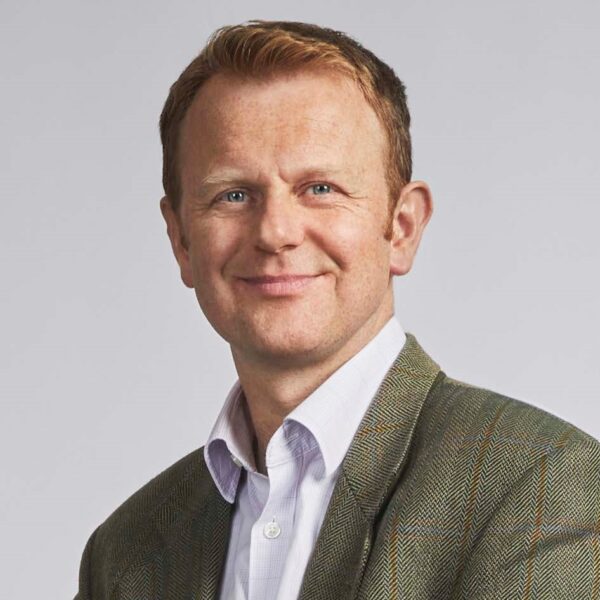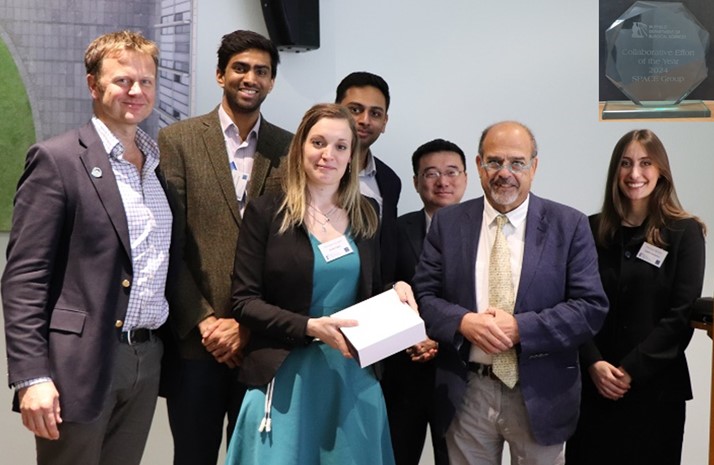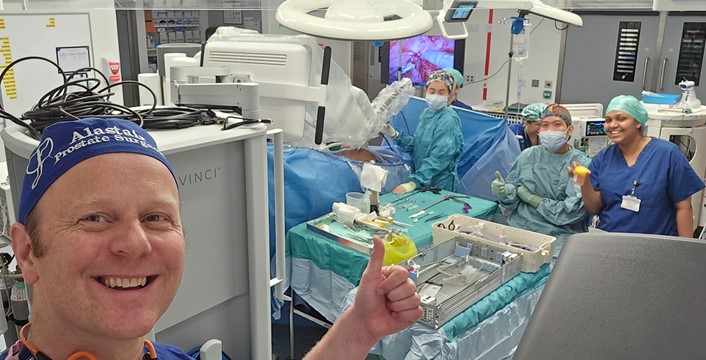Introducing: Dr Alastair Lamb
We are delighted to welcome Alastair Lamb to the Barts Cancer Institute (BCI) at Queen Mary University of London. Dr Lamb joins our Centre for Cancer Evolution, where he will launch the next phase of his research, supported by a new £1.6m Advanced Clinician Scientist Fellowship grant from Cancer Research UK, starting April 2025.
As a clinician scientist and consultant urological surgeon, Alastair Lamb’s work bridges the laboratory and the clinic. He and his team use cutting-edge genomics techniques to study prostate cancer, aiming to distinguish individuals with aggressive disease who require intensive treatment from those with less severe conditions who can safely avoid unnecessary therapies and their side effects.
We spoke to Alastair to learn more about his journey to BCI and his plans for the next stage of his research.
Tell us about your research interests.
My research focuses on prostate cancer, an area with significant unmet clinical need. Prostate cancer is incredibly common – around half of men will develop it if they live to age 80. In the UK, more than 55,000 men are diagnosed every year. But, unlike some cancers, the vast majority of cases are not severe. The challenge lies in accurately identifying the minority of men who need treatment. If we are not careful, many thousands of men are at risk of undergoing unnecessary treatment – this could include invasive operations leading to side effects such as incontinence, or hormone and radiotherapy that can cause sexual and bowel dysfunction.
The question that interests me is: how can we determine the right treatment for the right patient at the right time?
How has your research developed during your career?

"Cancer surgery is not just about technical skills but about good decision-making. I hope that we will soon introduce a robust molecular component to that decision-making in prostate cancer."
— Dr Alastair Lamb
After completing my medical training at Oxford and Edinburgh universities, I undertook a PhD in Professor David Neal’s lab at the CRUK Cambridge Institute, focusing on cell biology in prostate cancer, supervised by Professor Ian Mills with whom I continue to work closely. At that time, we didn’t yet have the tools to interrogate early-stage disease in detail. However, big genomic studies were starting to emerge, including in a lab next to ours led by Professor Carlos Caldas, whose METABRIC study identified distinct genomic features in different subgroups of breast cancer. This prompted me to wonder whether we should apply a similar approach to prostate cancer.
I completed my clinical fellowship at the Peter MacCallum Cancer Centre in Melbourne, Australia, where I focused mainly on robotic surgery, after which I returned to the UK to undertake my first consultant job in Oxford and set up my own lab.
My group – which we call the SPACE lab (Spatial Prostate Assessment and the Circulating Environment lab) – employs advanced genomic tools to examine cancer in great detail in small numbers of patients, generating rich datasets.
We are particularly interested in studying cancers right on the brink of spreading, at the crucial point where clinicians must decide whether to proceed with surgery, radiotherapy or even chemotherapy, or alternatively to manage things expectantly with what we call active surveillance.
We use a powerful technique called spatial transcriptomics, which maps genetic changes across different regions of a prostate tumour. In a 2022 Nature paper, we used this technique to show that, surprisingly, many of the genetic changes previously thought unique to cancer tissue are already present in seemingly healthy prostate tissue. This discovery has important implications for how we diagnose prostate cancer and decide what parts of the tissue need treatment.

Short video explaining key findings of the SPACE Lab’s “Organscale” paper”
What attracted you to the BCI?
I finished my first CRUK fellowship in Oxford and asked myself: where would be the best place in the country to conduct the next phase of my research? Although I had developed expertise in integrated genomics, I wanted to collaborate more closely with experts in the tumour microenvironment, circulating tumour cells, and artificial intelligence (AI) and machine learning. Those skill sets are all here in abundance at the BCI!
I was also drawn by the Centre for Cancer Evolution, where my lab now sits. Cancer Evolution has been central to my research for the past five years, so being embedded in a centre with colleagues who approach cancer evolution from diverse perspectives felt incredibly valuable.
Clinically, I’m based at Guy’s and St Thomas’ Hospital, which is known for its excellence in prostate cancer care and robotic surgery. London’s diverse patient population is also a crucial benefit for prostate cancer research, which we know disproportionally affects Black men of African ancestry.

What research questions will you tackle in your new lab?
I will be using my new CRUK fellowship funding to launch the next phase of my lab: SPACE-X (definitely no association with Elon Musk!).
We are aiming to use our spatial transcriptomics approach to develop accurate tests or genomic scores that help clinicians determine early which patients require intensive treatment and who might safely avoid invasive therapies. In addition, we are exploring non-invasive methods like advanced imaging and ‘liquid biopsy’ blood tests for circulating tumour cells to improve these decisions.
I’m excited to tackle these challenges surrounded by such a breadth and depth of expertise at the BCI. I have the privilege, now, of working alongside not only other experts in prostate cancer, such as Yong-Jie Lu and Prabs Rajan, but also experts in the tumour microenvironment such as Kebs Hodivala-Dilke and Gabrielle d'Amico, and AI specialists such as Oscar Maiques-Carlos and Vivek Singh, as well of course as my excellent new colleagues in the Centre for Cancer Evolution, wonderfully led by Francesca Ciccarelli. This expertise will help me to approach research questions from different angles.
What are your hopes for the future of your field?
I hope we are headed towards truly intelligent, individualised molecular decision-making. This should include using molecular and genetic information to ensure that the surgery we’re doing is as precise as it can be (to minimise side effects) but as radical as it needs to be (to effectively tackle the cancer). It’s been said that “a good surgeon knows how to operate; an excellent surgeon knows when to operate”. Cancer surgery is not just about technical skills but about good decision-making. I hope that we will soon introduce a robust molecular component to that decision-making in prostate cancer.
And finally: when you're not immersed in your research, how do you enjoy spending your time?
I’ve always liked making things – for example, I’ve recently become interested in welding and carpentry. This year, I taught myself how to use a lathe. I’ve been enjoying turning foraged wood into candlesticks and peanut bowls and, most recently, a vase!
Category: General News, Interviews

No comments yet